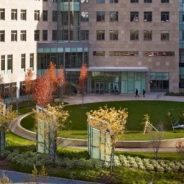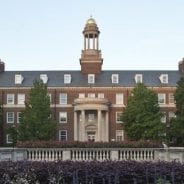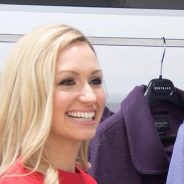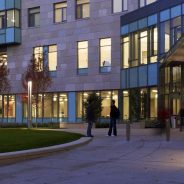Search results for :
STEM Startups, Notre Dame’s New Master’s, and More – Chicago News
Let’s explore some of the most interesting stories that have emerged from Chicago business schools this week.
Why a Choice Doesn’t Feel Like a Choice When Morality Enters the Picture – Kellogg Insight
In new research co-authored by Northwestern Kellogg Assistant Professor of Management and Organizations Maryam Kouchaki finds that “across cultures, when people view a particular decision as being moral in nature, they don’t feel like they are making a choice at all, and they pay less attention to alternative courses of action.”
In other words, “people who viewed a particular issue as moral experienced a lower sense of choice when making a decision related to that issue, as compared to people who did not view the issue as moral.”
Kouchaki notes, “Even though they did the most amazing thing, it wasn’t like they felt that they deliberated. They felt like they had no choice. Their sense of freedom has been constrained and it has a spillover effect for your actual behavior.”
The study was co-authored by Cornell’s Isaac Smith and Nanyang Technological University’s Krishna Savani of Nanyang Technological University.
You can read the full article here.
Notre Dame launches New Graduate Degree in Business Analytics – Mendoza Ideas & News
Notre Dame’s Mendoza College of Business just announced its new one-year, 31-credit-hour Master’s of Science in Business Analytics (MSBA), designed for “pre-professional students with little or no work experience.”
In a recent release, John W. Berry, Sr. Professor of Business and Chair of the Information Technology, Analytics, and Operations Department, describes MSBA students:
“They were either recent graduates that didn’t have the work experience, or international students interested in the STEM degree who wouldn’t be able to work while earning their degree.”
According to the school, the program’s goal is to “provide a rigorous education in applying analytical techniques to massive data sets to solve business problems — knowledge that has become critically important due to revolutionary advances in information technology.”
Katherine Spiess, Associate Dean for Graduate Programs at Mendoza adds, “In addition to learning about cutting-edge data analytics, our MSBA students have the opportunity to explore the ethical dimensions of collecting and analyzing data to promote business as a force for good in society.”
You can find out more about the brand new Notre Dame Master’s of Science in Business Analytics here.
MakerGirl Thrives and Expands to New Heights – Gies School of Business News
MakerGirl, a nonprofit founded by Gies College of Business students to enable “college students to teach science, technology, engineering, and math (STEM) skills to girls ages 7-10,” recently expanded its operations to include robotics and special coding classes at Northwestern University and announced plans to collaborate with DePaul University.
The goal of MakerGirl’s founders is to “impact 10,000 girls by 2023, including half from underrepresented and rural communities.”

The nonprofit MakerGirl startup is built to help introduce young women with leading STEM graduates / Photo via https://www.kickstarter.com/projects/1501163298/makergirl-goes-mobile-midwest-edition
Julia Haried (’15 ACCY, ’16 MAS) and full-time employee at Deloitte, recently spoke about how invaluable the support of the school has been to the launch and growth of MakerGirl.
“In [my social entrepreneurship] class, the idea was born and incubated by myself and co-founder, Elizabeth Engele, and supported by course instructors. The idea was further launched in the iVenture Accelerator, a Gies-supported venture accelerator that gave us $10,000, mentorship, and a summer to grow MakerGirl’s impact at the Research Park. Because of these experiences, I was challenged and encouraged to solve a big social problem.”
Co-founder Elizabeth Engele also adds, “It’s so much fun and fulfilling to build a program that creates a meaningful experience for girls right now that also impacts their future. We have witnessed girls self-identify as MakerGirls after the program, which is incredibly powerful for themselves, their families, and their communities.”
She continues, “MakerGirl brings me the greatest joy when I see young girls get excited about science, technology, engineering, and math, and literally shift who they perceive themselves to be in the world.”
You can read more from the interview here and visit MakerGirl’s official site for more information.
New MBA Jobs: Bain & Co., ESPN, Dell, and More
When it comes to the latest and greatest MBA jobs, MetroMBA has got you covered. Whether you’re looking for a consulting job at one of the top firms, or a tech job across the globe, this list has a little something for everyone. Check out this week’s curated list of new MBA jobs below: Continue reading…
Analyzing Credit, Bargain Hunting and Harvard, and More – Boston News
Let’s explore some of the most interesting stories that have emerged from Boston business schools this week.
What an MIT Professor Learned Analyzing 1 Million Credit Card Offers – MIT Sloan Newsroom
MIT Sloan Professor of Finance Antoinette Schoar used her appearance on Sloan’s “Data Made to Matter” podcast to discuss what analyzing one million credit card offers revealed.
“What we seemed to find in our study is that the [credit card] offers that are offered to less educated people rely in their pricing much more on these additional fees. Late fees, over limit fees, maybe default APRs that switch on once you’ve had a default,” she says on the podcast.
Schoar adds, “While people that are more educated, their cards seem to rely much more on the quite straightforward features, like they are paying an annual fee, and they’re paying an interest rate, but they are relying much less on these late fees and over limit fees.”
She also offers this takeaway for consumers:
“The more companies can model our behavioral biases, the more they can use them in extracting rents from us or catching us in moments when we’re inattentive or when we are not necessarily focused enough on choosing the right credit card, the right mortgage, or any of these products.”
You can read the full article here.
Bargain Hunters Beware: A Store’s ‘Original Price’ Might Not Be After All – Harvard Business Week
In a new working paper, Donald Ngwe, a Harvard Business School Assistant Professor, found that the “original price” many retail stores advertise in relation to an item’s hot bargain rate is often completely made up. In fact, the practice is much “more common than shoppers might realize.”
Ngwe says, “They never even tried to sell the product at that price. Consumers could never have bought that product at that price even if they tried.”
On Amazon, for instance, he notes that almost every item has a “struck-out price, but if you look at the policy behind that price, it’s incredibly vague. This makes me think that the fake prices are working to mislead the customers who know the brand the least, and who have the least information about the brand, into making a decision they would not have made otherwise.”
Ngwe’s research found that if customers “were given verifiably fake prices,” it actually does not change people’s “evaluation of quality” since we have gotten so used to the practice.
He concludes, “My results show that customers don’t see through the ruse. Even in outlet stores where they might expect some level of false discounting, they are still very influenced by these signals.”
You can read Ngwe’s paper Fake Discounts Drive Real Revenues in Retail here or the original HBW article here.
From Sheet Music to Spreadsheets – Sawyer Business School Blog
Sawyer Business School recently profiled Craig Pellet, MST ’18, a classically trained composer who ended up with a career at Boston firm Back Bay, from a Craigslist ad he answered on a whim.
Ten years after joining the firm, Pellett feels he had a number of major gaps that made it difficult to “solve client issues” so he decided to pursue Sawyer’s Master of Science in Taxation degree to “give [him] better tools to approach every problem.”

Craig Pellet, Sawyer Business School, MST ’18 / Photo via suffolk.edu
“Music teaches you how to practice, be committed, and be focused. It puts you in the mind-set: I want to get good at this, but it’s going to take me 10 years. So it’s time to start chipping away at it,” Pellett tells the Sawyer blog.
Pellett ended up working with his tax policy instructor Professor Michaele Morrow on a research paper that explored the notion of eliminating S-corporations to make taxation more fair. Morrow described Pellett’s notion as “pretty radical.”
“I somewhat believed him but wanted to really see. So I asked him to run the numbers. Turns out, he was right.”
Their paper was recently published in trade publication Tax Notes.
You can read the full interview with Pellett here.
Hot MBA Jobs: Computer and Information Systems Manager
For those looking to pursue a management career at the tech end of the business world, Computer and Information Systems Manager may be a promising career to pursue.
The U.S. Bureau of Labor Statistics estimates the growth rate for this job at 12 percent over the next eight years. But, are you not sure where to begin? Below, we’ve put together a guide to help you determine if this is the career for you.
What is a Computer and Information Systems Manager?
The Computer and Information Systems Manager (or IT Manager) runs the company activities related to computers and tech. They must assess the needs of an organization to determine the appropriate hardware and software to both meet demands of and enhance the efficiency of company business. In addition to installing and maintaining hardware and software, IT Managers must stay abreast of new tech developments so that they can pitch ideas to upper-management should they identify an opportunity to implement technology that would advance the company’s mission. The IT Manager also directs and organizes the efforts of the lower-level positions in the IT department.
There are different types of Computer and Information System Managers, so duties may be more specifically tailored depending on the specific title. For example, an IT Security Manager would work with the tech as it pertains to protecting an organization’s security interests.
Am I A Good Fit?
IT Managers possess solid analytical skills. People in this role need to be able accurately evaluate a company’s needs and determine which products would enhance productivity. They must also be able to analyze any tech and management issues to ensure that their department runs smoothly. They are solid, decisive leaders and creative thinkers. Communication skills are essential, as IT Managers must communicate directions to those working under them, as well as deliver presentations to higher-level execs.
In 2017, the average base pay for a Computer and Information Systems Manager, according to Glassdoor, was $106,092 in the United States.
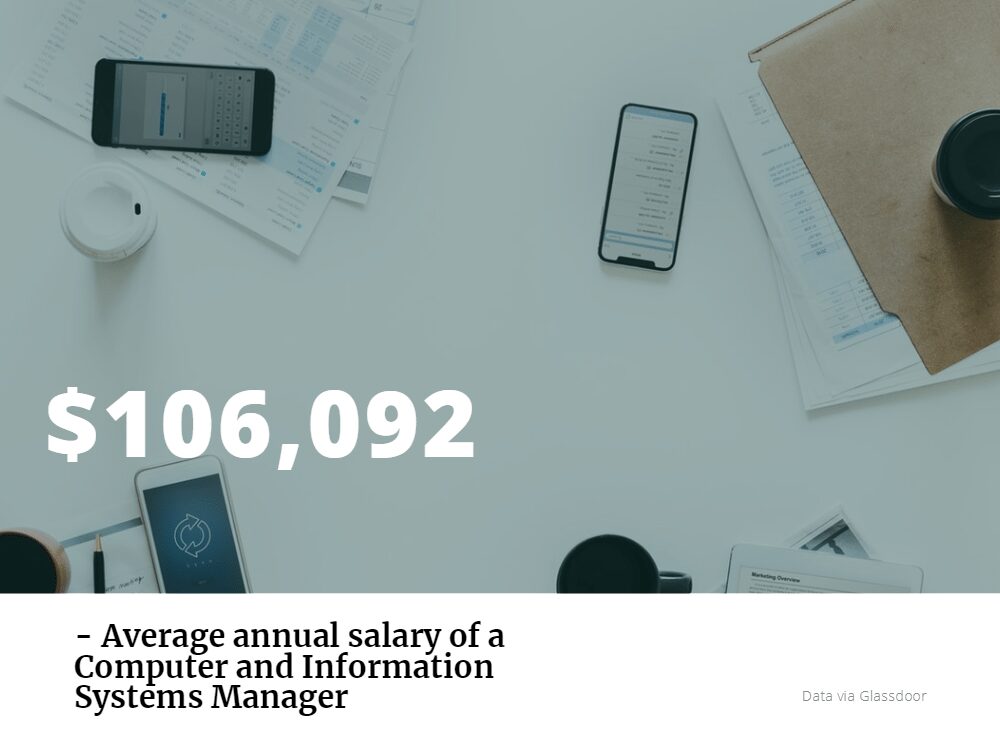
Education and Where to Begin
The minimum degree requirement for a Computer and Information Systems Manager is generally a bachelor’s with a tech-related major. However, according to the U.S. Bureau of Labor Statistics, companies often require graduate degrees, and earning an MBA could prove to be a huge asset. If you are looking to pursue this title, it may be beneficial to start with entry-level tech positions in your field to gain a few years of experience before applying to a manager position.
An MBA program with a top-notch tech education may be a good place to start if you’re hoping to become an IT Manager. In 2018, U.S. News made a list of the best MBA Information Systems programs. Below, we’ve pulled some of our favorite MBAs from the list:
Sloan School of Management – MIT
It should come as no surprise that MIT Sloan tops the list of best Information Systems programs. MIT has long been hallowed ground for the technologically-inclined, so it makes sense that the school’s MBA program also caters to those with a bent toward tech, with 26.2 percent of the 2017 graduating class pursuing careers in the software and internet industries.
McCombs School of Business – University of Texas at Austin
McCombs, which has a nationally-ranked MBA in Information Systems program, is a desirable choice for the STEM-savvy. According to the McCombs employment report, 30 percent of the class of 2016 pursued jobs in the tech industry.
Scheller College of Business – Georgia Tech
Georgia Tech’ Scheller College of Business is an excellent choice for aspiring IT Managers. Forbes states, “Because many students are interested in more quantitative and technical areas, such as operations management and information technology management, Scheller is often viewed as a heavily quantitatively based program.” Roughly 21 percent of the Scheller class of 2017 landed tech-related jobs.
Leavey School of Business – Santa Clara University
For Silicon Valley hopefuls, the Leavey School of Business may be a wise school to consider. With flexible options like the Online and Evening MBA’s, Leavey allows students to tailor the program to their schedule. This may be desirable for those trying to balance internships or work and family life.
Cal State Fullerton Debuts New Accounting Courses, and More – Los Angeles News
We’ve rounded up the biggest news stories coming from business schools in the Los Angeles metro area this week, including the introducing of new Cal State Fullerton accounting courses.
CSUF Mihaylo Accounting Program Debuts New Courses – Mihaylo Newsroom
The Mihaylo College of Business at the California State University, Fullerton recently announced new courses in the school’s accounting program. The accounting department, which aims to provide students with a well-rounded introduction to the field, hopes the new courses will offer the skills necessary for students to succeed in the industry, whether within major companies or smaller firms.
The new courses will include: Accounting Data Analytics, Seminar in Contemporary Accounting Problems, and Accounting for Income Taxes.
All classes will be available in either fall 2018 or spring 2019 semester. Classes will be taught by professionals in the field, such as Ernst & Young Executive Director of Tax Services Roger Idnani, who teaches the Accounting for Income Taxes.
Click here for more information on the Department of Accounting at Cal State Fullerton Mihaylo.
Report from the Summit: Blockchain, Tariffs and Transformation Were the Buzz at Sixth Annual Global Chain Excellence Summit – USC Marshall Newsroom
Visitors from around the world gathered in at USC’s Marshall School of Business this August for the sixth annual USC Marshall Global Supply Chain Excellence Summit. The two-day conference which gathered more than 500 leaders in the field to share their thoughts and industry insight.
USC Marshall dean, James G. Ellis, comments:
“We are fortunate to be able to facilitate a meeting of the institutions, government agencies, entrepreneurs, professionals and students engaged at the highest levels of the global supply chain.”
The conference included a lineup of keynote speakers, presentation of industry awards, and updates from the field. In addition to staying current within the industry, the conference helps to connect business students with those in the field seeking fresh talent. At the close of the summit, attendees were invited to join for a reception and industry career fair, allowing for networking opportunities.
Read more about USC Marshall and the Supply Chain Excellence Summit here.
L.A. County Jobless Rate Steady at 4.5 Percent in July – Los Angeles Business Journal
A new report from the Los Angeles Business Journal reveals that the county’s unemployment rate has remained steady throughout the summer, staying at roughly 4.5 percent throughout July.
Despite seasonal job losses throughout the education sector, the rate of unemployment in L.A. County remains the same. Adjusting for the payroll jobs that dropped in June with the end of the academic year, L.A. County reported a net gain of 7,300 jobs in July. Over the past year, the net gain has been roughly 49,000 jobs, or 1.1 percent. The slow growth seems to indicate the fact that L.A. County has been operating at nearly full-employment for some time.
To read more about job growth in L.A. County and read the Los Angeles Business Journal‘s full report, click here
University of Maryland Reveals MBA Deadlines, Essays
The newest University of Maryland MBA deadline dates for UMD Smith are here. Mark your calendar with the details below.
University of Maryland Deadlines (2018-19)
Round One
Deadlines: October 1, 2018
Notifications: December 23, 2018
Round Two
Deadlines: November 1, 2018
Notifications: January 15, 2019
Round Three
Deadlines: December 15, 2018
Notifications: March 15, 2019
Round Four
Deadlines: January 15, 2019
Notifications: April 15, 2019
Round Five
Deadlines: March 1, 2019
Notifications: May 1, 2019
University of Maryland Smith MBA Essays
Required Essay
Why Smith? Why an MBA? Why now? Be sure to include your short-term and long-term career goals (300 words).
Optional Essay
Please use this essay to discuss anything additional about your candidacy that you have not yet shared in your application.
New SMU Deadlines and Essay Questions Revealed
The newest Southern Methodist University MBA deadline dates for the Cox School of Business are here. Mark your calendar with the details below.
SMU Deadlines
Round One
Deadlines: October 15, 2018
Round Two
Deadlines: December 3, 2019
Round Three
Deadlines: January 7, 2019
Round Four
Deadlines: March 4, 2019 (Final International Deadline)
Round Five
Deadlines: April 29, 2019 (Final Domestic Deadline)
SMU Cox is accepting applications after April 29 on a rolling basis.
SMU MBA Essay Questions
1. (All applicants) “What are your post-MBA goals upon graduation? Please be as specific as possible, which might include desired roles, target companies, and/or industry.”(250 word limit)
2. (All applicants) “In three words, how would a coworker or professional mentor describe you? In three words, how would your closest personal friend describe you?” (six word limit)
3. (Full-Time, Fast Track, JD/MBA students only) “Think of an event that has changed your perspective in the last three years. Describe how this event has impacted your personal or professional outlook.” (250 word limit)
4. (Full-Time, Fast Track MBA applicants only) “Business is an ever changing and evolving entity. Individual’s plans and interests can change as a result of industry downturns and/or emergence of new opportunities. Keeping an open mind while navigating your career is an essential component of success. Should the short-term goals you provided above not materialize, what alternative direction would you explore?” (250 word limit)
5. (MA/MBA students only) “How do you plan to make an impact on the arts/non-profit community and how specifically would your graduate education help you do so?” (250 word limit)
6. (MA/MBA students only) “Tell us about a time in the past three years your opinion about an arts/non-profit organization was changed and how.” (250 word limit)
Check out the official SMU Cox website for more application information.
Top MBA Recruiters: Fidelity Investments
When deciding to earn an MBA, you may have a lot of expectations. Whether you are more excited to build a professional network, gain industry-specific training, or develop leadership skills that can take your career to the next level, MBAs can certainly all agree on one thing they hope to get from their program: a job.
MBA graduates can feel more confident entering the job market knowing that top companies throughout the world are looking to recruit talent like them. To help find the perfect fit, MBAs might consider looking at employment reports from their school and other MBA programs around the world. This can help reveal some of the top companies in the country that are actively looking to recruit MBA talent to join the company.
One familiar company is Fidelity Investments, a multinational financial services with its headquarters in Boston, Massachusetts. Fidelity consistently makes the list of companies hiring MBA grads from some of the best business schools in the country, such as MIT’s Sloan School of Management. Originally founded in 1946, Fidelity today is the fourth largest asset manager in the world, with $2.4 trillion in assets.
Knowing that, how can you find Fidelity jobs that are right for you?
What is a Fidelity Career Like for MBAs?
Fidelity’s slogan is ‘blaze your own trail’, which probably explains why ambitious MBAs fit in well at the company. The company offers a number of ways for MBA grads to do so, whether through internships or full-time development programs. Whether graduates are interested technology, finance, investment, or business strategy, there are a variety of Fidelity jobs open for MBAs and MBA graduates.
Fidelity not only encourages their employees to blaze their “own trail,” but aims to create the perfect environment in which to do so. MBAs might be pleased to know the company has been recognized among the “50 Happiest Companies” by Career Bliss in 2018, and in 2017 it was recognized by the National Business Group on Health as one of the “Best Employers for Healthy Lifestyles,” and a “Best of the Best” by the National Business Inclusion Consortium.
Among the other benefits of working in a diverse and happy workplace like Fidelity, the average salary for employees with an MBA degree is $89,271, according to Payscale data. This can vary depending on the specific career path of each MBA, the highest being MBAs in Global Business Management, who make an average salary of $93,000 per year.
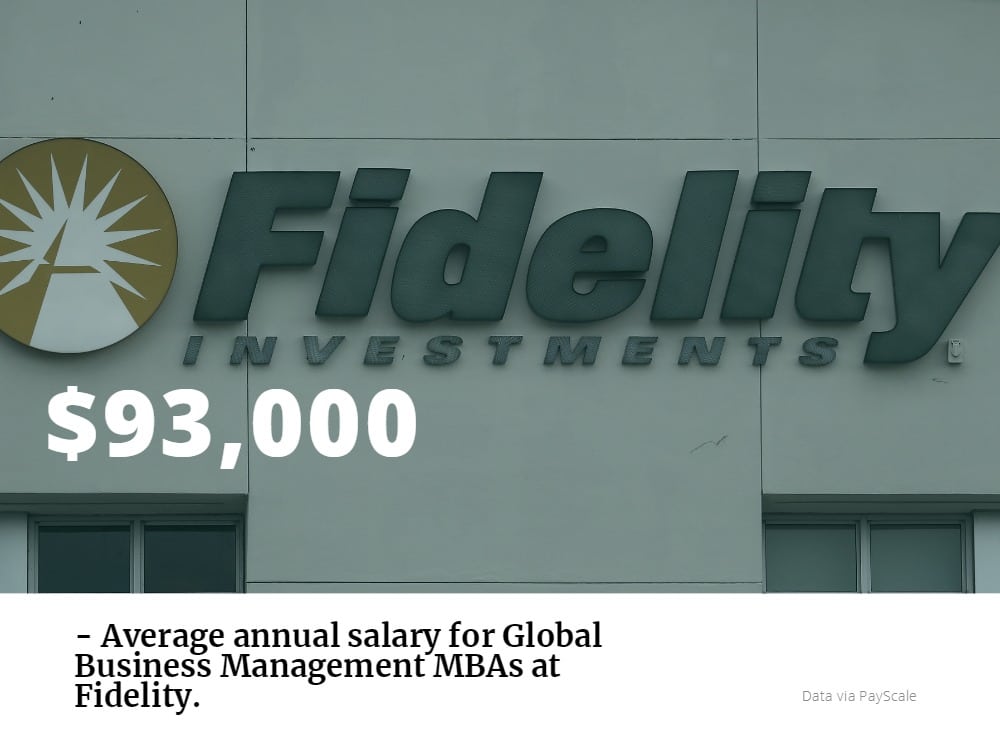
Several of the most prominent business schools in the country offer valuable Global Business Management MBA degree. Of which, include:
- The McDonough School of Business at Georgetown University
- The Fox School of Business at Temple University
- The Foster School of Business at the University of Washington (EMBA)
Starting the Fidelity Jobs Search
Fidelity demonstrates a commitment to hiring MBAs through an active recruitment program. The program includes Coffee Chats and Campus Presentations at business schools throughout the country. These visits give current students the chance to meet those currently doing the work that MBAs would likely do at the company, including Research Analysts, Directors of Research, and Portfolio Managers.
MBAs starting at Fidelity typically have two main career paths they will follow. Some may develop into a Portfolio Manager. Others may become a Career Sector Analyst. First round interviews typically occur on-campus, but special arrangements are made for students not on Fidelity’s campus recruitment schedule.
At Fidelity International, the company’s international investment subsidiary, there are additional opportunities for current MBAs to join the company as summer interns. The Equity Research Analyst Summer Internship is an 8-12 week global internship with opportunities in the UK, Hong Kong, Australia, Japan, Korea, Singapore, India, and China.
What Does Fidelity Look For in MBA Candidates?
When hiring MBAs for internships and development programs, Fidelity may have different needs and requirements for applicants depending on the specific field and career they seek. Hard skills tailored to your field of interest are necessary, however. Fidelity also looks for candidates with important soft skills like initiative, ambition, the ability to think independently, and keep cool under pressure.
Interested students can begin searching for Fidelity jobs on the official company website. Applicants should keep in mind the different opportunities available for those currently in an MBA program, near completion, and post-graduation.
The Newest Fordham EMBA, and More – New York News
Let’s explore some of the most interesting stories that have emerged from New York business schools this week.
New EMBA Program Prepares Athletes and Artists for Second Careers – Gabelli Connect
Earlier this month, the Fordham Univesity Gabelli School of Business unveiled a new EMBA program that caters to athletes and artists. Associate Dean Francis Petit, who will preside over the new program, writes about the specific segment the EMBA will service:
“Overall, this segment is looking to reinvent themselves and reinvention is oftentimes arduous. This program will provide the necessary tools.”
Petit compares the collective and collaborative academic journey that participants will take to the experiences athletes had among their teammates.
According to the article, the new EMBA will include “team projects, career coaching, presentations, and site visits to companies in the New York area, along with a capstone project.”
You can read more about the new Gabelli EMBA program here.
What Everyone Needs to Know When Traveling Abroad – Columbia Business School News
New research co-authored by Columbia Business School’s Michael Morris explores the question of how far should you go to “adopt local ways when your work brings you abroad?”
Not surprisingly, Morris’s paper “Do As the Romans Do? Diversity Ideologies and Trust in Evaluations of Cultural Accommodation” finds that the answer is complicated.
“If you’re wondering whether to try to speak limited Spanish in Barcelona or say ‘G-Day’ in Sydney, the answer is a yes. Accommodate to a moderate extent and locals will appreciate the gesture,” he writes. “Visitors need to be careful not to overdo it, since going too far can cause a backlash. This research sends the simple message to foreign visitors that effort matters. It’s a sign of respect and authenticity.”
You can read more of Morris’ advice here.
The Secret to Influential Management Research? It All Comes Down to Data – Stevens Institute of Technology School of Business News
The Stevens Institute of Technology School of Business recently profiled Emeritus Professor Dr. Richard Reilly, whose pioneering work in talent management research was honed during a distinguished career designing studies at Bell Labs, AT&T, and ETS. The article notes that Dr. Reilly was “recognized by Academy of Management Learning and Education as being among the top 1 percent of all researchers in human resource management and strategy, as measured by textbook citations.”
Dr. Reilly notes, “Understanding these organizations and how they work gave me access to data that helped me do meaningful research, write articles and teach to what was actually going on in the workplace.”
Dr. Reilly explains one of the impetuses for his research:
“The issue with testing is that the outcome in higher education is so much harder to pin down. Is it grades, or something more nuanced, more complex? I got interested in looking in the issues around fairness in tests, as it relates to gender and background.”
You can read more about Dr. Reilly here.
Wharton Economist, Berkeley Alum Ann Harrison Named New Haas Dean
Ann Harrison, a renowned economist and member of the faculty at the University of Pennsylvania’s Wharton School, has been named the next dean of the UC Berkeley Haas School of Business. Harrison earned her undergraduate degree from Berkeley and served as a professor in Berkeley’s Department of Agricultural and Resource Economics from 2001 to 2011.
“Professor Harrison is an accomplished administrator as well as a world-class economist who has dedicated her career to creating forward-looking policies in development economics, international trade, and global labor markets,” Berkeley Chancellor Carol Christ said in a statement announcing the appointment. “It is a great honor to welcome her back to Berkeley to become the dean of Haas, and I have no doubt that she will be a wonderful leader the institution.”
Harrison, who will begin her term on January 1, 2019, said she is thrilled to return to Berkeley and looks forward to meeting Haas students and alumni and working with its distinguished faculty and staff, according to the release from the school.
Harrison worked as director of development policy at the World Bank before joining the Wharton faculty in 2012, co-managing a team of 300 researchers and staff. In her time with the World Bank, she reformed its research fund allocation process and supervised its most important publications, including the annual World Development Report. Setting a milestone in transparency for the institution, she convinced the World Bank’s president to release all historical records on project loans.

Ann Harrison named new Haas dean
“Ann has a remarkable track record of pioneering research on trade and development, including influential studies of globalization’s effects on jobs and inequality,” Berkeley Economics Professor Maurice Obstfeld said in a statement. Obstfeld serves as chief economist at the International Monetary Fund and was a colleague of Harrison’s when she worked in Berkeley’s Agricultural and Resource Economics Department.
Princeton Professor Emeritus Sir Angus Deaton, who has known Harrison since her days as a graduate student at Princeton, praised her appointment. “Based on Ann’s experience at the World Bank, she will be an effective and much-loved manager,” said Deaton, who also holds the 2015 Nobel Laureate in Economic Sciences for his analysis of consumption, poverty, and welfare.
In addition to a Ph.D. in economics from Princeton, Harrison also holds a diplôme d’études universitaires générales from the University of Paris and is a research associate at the National Bureau of Economic Research and a member of the United Nations Committee for Development Policy. Author and editor of three books—including Globalization and Poverty and The Factory-Free Economy—Harrison is one of the most highly cited scholars globally on foreign investment and multinational firms.
Harrison replaces outgoing Dean Rich Lyons, who stepped down in June 2018 after serving as Haas dean for the past 11 years. He plans to return to teaching at Haas after completing a sabbatical. Haas Professor Laura Tyson, who has served as interim dean since Lyons’ departure, will remain in the role until January, 2019.
This article has been edited and published with permissions from our sister site, Clear Admit.
New MBA Jobs: McKinsey, AT&T, Barclays and More
Big time companies are hiring in some the world’s most bustling metros. Check out the hottest new MBA jobs at top consulting companies, supply chain departments, and financial institutions across the country below:
Executive MBA
Kennesaw State Executive MBA Program Structure
The Kennesaw State Executive MBA program at the Coles College of Business is an 19-month schedule that makes it possible for students with busy professional lives to pursue an MBA. Classes take place on Saturday and Sunday one weekend a month and are taught right on the Kennesaw main campus.
Curriculum
The Kennesaw State Executive MBA provides real-world insight to students by focusing on the CEO’s perspective. The program emphasizes business fundamentals and their application to contemporary business problems. Coles uses a combination of custom case studies, the Harvard Business School case method and a hands-on learning approach to prepare their students for problems they will face in their professional career.
Class Profile
The average age of a Coles Executive MBA student is 38-years old. Sixteen years of professional experience is the average for incoming students, with around 9 years of management experience. The average undergraduate GPA is 3.11. An estimated 5 percent of the class enrolled submitting GRE scores, rather than the more traditional GMAT.
About 45 percent of the Executive MBA program class is of minority status, with 40.4 percent female students and 59.6 percent male students.
Tuition, Scholarships, and Financial Aid
The current estimated cost for the entire Kennesaw State University Executive MBA is $57,000, plus an additional fee of $600.
Admissions
To apply to the Kennesaw State Executive MBA program, applicants must submit a current résumé, be interviewed with an admissions representative, complete the online application, submit two professional recommendations, submit all official transcripts from any graduate or undergraduate institution, and complete a record of immunization. GMAT/GRE scores are not typically required. Executive MBA application fees are $75.
Any international applicants must be able to document that their degree is equivalent to a four-year bachelor’s degree awarded by an accredited United States college or university. International applicants will need to request a course-by-course description, grade point average equivalent and degree equivalent.
- Application Deadline: Accepting applications for Fall 2022
Cornell Study Reveals Curious Fashion Findings, and More – New York News
Let’s explore some of the most interesting stories that have emerged from New York business schools this week, including curious new findings from a recent Cornell study.
How Disclosing Sponsored Content Affects Consumer Trust in Bloggers – Johnson Business Feed
Cornell University SC Johnson Graduate School of Management Assistant Professor of Management and Organizations Sunita Sah, along with Georgetown’s Prashant Malaviya and Debora Thompson, recently co-authored new research that examines how “consumers react to disclosures of sponsorship from fashion bloggers.”
In a recent release from the Johnson Business Feed, professor Sah writes, “In contrast to much of the previous research on conflict of interest disclosures, we found that in the context-rich setting of online blogs, conflict of interest disclosures have the unanticipated consequence of increasing, rather than decreasing, consumer trust in the blogger and their expertise.”
Sah explains how the blogosphere could more effectively handle disclosures:
“If the purpose is to protect consumers by assuming they will make the necessary adjustments to the advice they receive, it’s crucial that we consider the impact of processing by readers and thoroughly understand any unintended consequences that may occur. We may just have to think harder for solutions other than disclosure to manage conflicts of interest.”
You can find more about the Cornell study here.
Round-the-Clock Work Emails Impact Health, Relationships – Lehigh College of Business and Economics Blog
New research co-authored by Lehigh University College of Business and Economics Associate Professor of Management Liuba Belkin, Virginia Tech’s William Becker, Colorado State’s Samantha A. Conroy, and Virginia Tech doctoral student Sarah Tuskey finds that “personal relationships and home life suffer for those tied to their work emails round-the-clock.”
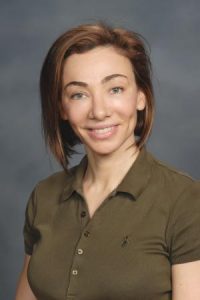
Liuba Belkin, Ph.D., Lehigh Associate Professor of Management
According to the Lehigh College of Business and Economics Blog, the study is the first to “test the relationship between organizational expectations to monitor work-related electronic communication during non-work hours and the health and relationship satisfaction of employees and their significant others.”
Belkin notes that round-the-clock work emails are “an insidious stressor that not only increase employee anxiety, decrease their relationship satisfaction and have detrimental effects on employee health, but also that they negatively affect partner (significant other) health and marital satisfaction perceptions.”
Belkin recommends that organizations “set off-hour email windows and limit use of electronic communications outside of those windows or set up email schedules when various employees are available to respond.”
The researchers presented “Killing Me Softly: Electronic Communications Monitoring and Employee and Spouse Well-Being” at the Academy of Management annual meeting in Chicago earlier this month and is due for publication in the Academy of Management Best Paper Proceedings.
You can read the full article here.
Professor Applies Principles of Operations Management to New Areas – Rutgers Business News
The Rutgers Business School recently published a profile of Supply Chain Management Department Chair and Associate Professor Lian Qi, whose research “goes beyond the traditional supply chain domain [to explore] new and relevant [topics] related to areas of high impact.”
According to the profile, highlighted in a recent release from Rutgers Business News, Professor Qi’s research “seeks to apply operations management principles and techniques to resolve customer service issues in … healthcare service and the service operations for electric vehicles.”
In the piece, Professor Qi explains why he opted to pursue a career in academia:
“My father is a professor who has inspired my various interests since I was a child. The second reason is that after I worked as a supply chain management consultant at SAP, I wanted to study more theoretical concepts in this area. I also love to work with students. This makes me feel that I can really help many people not just help a department within a company.”
YOu can read the full interview of Qi here.
London Business School Announces New Masters in Analytics and Management
Earlier this week, the London Business School officially announced the new LBS Masters in Analytics and Management program, which is slated to begin August 2019.
The 12-month LBS Masters in Analytics and Management, according to the business school, “is designed for top graduates with a quantitative degree or work experience, who want to combine a detailed knowledge of data analytics, with the ability to translate big data into bold visions and profit-maximising business strategy.”
The LBS Masters in Analytics and Management (MAM) will be the fifth official specialized master’s program provided by the business school, alongside the Masters in Management and Global Masters in Management (MiM), the Masters in Finance (MiF), and Masters in Financial Analysis (MFA). In a recent press release announcing the newest program addition, LBS’ Associate Professor of Management Science and Operations Tolga Tezcan, who will teach in the program, says:
“There is huge demand from the top recruiters for managers who are not only data literate, but who also have the vision to see how big data can be used to create real competitive edge, product or service transformation. That’s why we’re combining subjects like machine learning and data visualisation with organisational behaviour.”
In the release, Gareth Howells, LBS Executive Director, MAM, Degree Education & Career Centre, also adds, “Jumping into the vibrant London business environment, our students will experience data in action. Using real data to solve real problems on a live analytics project, they will learn how to translate the results of data analysis into insightful, high-impact business solutions.”

The new Masters in Analytics and Management will begin August 2019, costing £33,500.
What Is The LBS Masters in Analytics and Management?
The program, according to the business school, is centered around a core of: “Data Analytics, Applied Statistics, Data Visualisation and Storytelling, Data Management, Digital Marketing, Data Science for Business, Machine Learning for Big Data, and Decision Technology.”
The school assures that hopeful entrants in the program must have “a strong degree in a quantitative subject such as Engineering, Maths and Sciences, Computing, Economics, Accounting, Finance or Business, and Management.”
About 95 percent of entrants in the program come from the international community, representing 50 countries worldwide. The school adds that about 96 percent of its graduates from the aforementioned Masters in Management program earned employment within three months of graduation, and that “we expect our new MAM graduates to hit the ground running, entering sought-after sectors like technology and consulting with similar levels of success.”
In addition, students in the program will have the option to undertake a fourth term, which will only be available for students on specific career treks. In the fourth term, which will cost additional fees not yet revealed by LBS, students can “pursue the option to take three additional elective courses or go on an international exchange with a top business school.”
Head over to the official London Business School Masters in Analytics and Management page for more details.
Finding the Top MBA Employers in Washington DC
Students interested in earning an MBA and working in Washington DC will find no end to the opportunities available. Whether you are looking for opportunities at a governmental agency, a local business, or a massive international retailer, Washington DC—with 15 companies making the Fortune 500 list this year—can provide the perfect environment for MBAs at the start of their careers.
York Schulich Alum Designs for Meghan Markle, and More – Toronto News
Representatives from Toronto’s top business schools have been making the news this week. See what they’ve been up to below.
Canadian Designer Bojana Sentaler Goes Global After Meghan and Kate Made Her Coats Famous – Notable Life
Bojana Sentaler, graduate of York University’s Schulich School of Business, has attained enviable success in fashion design after both Kate Middleton and Meghan Markle were seen wearing coats from her collection. After years in the corporate world, Sentaler moved in a different direction, and decided to pursue her passion for design. Her business acumen was not wasted in her new field, as Sentaler quickly identified a need in Canada for outerwear that balanced elegance and warmth. She filled this need using alpaca fabric, which she discovered on a trip to Peru. In a recent interview, Sentaler said:
“There are some truly brilliant designers here in Canada, that deserve to be recognized on a global platform. But first our consumers need to support Canadian by proudly wearing Canadian, and our industry as a whole needs to support and recognize Canadian potential.”
Learn more about Sentaler’s journey here.
CMHC Moves to Make It Easier for Self-Employed to Get a Mortgage – CBC News
Traditionally, self-employed people in Canada have encountered more difficulty getting mortgages, making it much more complicated for them to purchase a home. However, the Canada Mortgage and Housing Corp. (CMHC) has made changes that will increase the flexibility of mortgage grants. Lenders can now use factors such as predictable earnings and previous training and education to justify giving a mortgage to someone who is self-employed.
Cynthia Holmes, Chair of the Real Estate Management Department at Ryerson University’s Ted Rogers School of Management, was optimistic about the changes, particularly insofar as they might help younger professionals lay down roots more quickly.
“This change could especially help young self-employed people access a mortgage more quickly, which supports innovation and entrepreneurship,” Holmes says to CBC News.
Learn more about the CMHC’s changes here.
All Work And No Play Can Make Us Less Productive, Research Shows – Australia Financial Review
A forthcoming study has demonstrated that long hours and stressful work have long-term negative impact on employees. The study (“Implications of work effort and discretion for employee wellbeing and career-related outcomes”) demonstrated that running employees ragged could have long term effects on their health and success.
According to the study, which was authored by Argyro Avgoustaki and Hans Frankfort, working more hours at a higher intensity does not enhance career prospects down the line. Efforts to protect the health of employees have generally emphasized shorter hours, but the study shows that controlling the intensity of the workload may actually be more important. Other researchers in the field have shown support for this perspective.
Erin Reid, associate professor at McMaster University’s DeGroote School of Business, co-authored an article with Lakshmi Ramarajan, assistant professor at Harvard Business School, for the Harvard Business Review. According to the article, “Valuing work time over work product—which motivates people to deceive others about how many hours they’re clocking—is an easy trap to fall into, especially for professionals, whose knowledge-based work is difficult to evaluate.”
Read more about the new research here.
New MBA Jobs: Apple, Fidelity, BlackRock, and More
Whether you earned your MBA after your undergraduate studies and want a great entry level position, or you’re a seasoned vet who earned their MBA to make a big career jump, there’s plenty of jobs out there for MBAs. Stay on top of the latest and greatest job opportunities for MBAs with this handy guide, useful for both those looking for their first big job or those looking for the next big thing: Continue reading…
MIT Announces 9 African Startup Challenge Finalists, and More – Boston News
Let’s explore some of the most interesting stories that have emerged from Boston business schools this week.
These 9 African Startups are Working Toward a More Inclusive World – MIT Sloan Newsroom
MIT Sloan recently announced the nine African startup finalists of The Initiative on the Digital Economy’s Inclusive Innovation Challenge, all of which use technology to “reinvent the future of work.”
Initiative Director Erik Brynjolfsson writes, “If we employ inclusive innovation globally, it could be the best thing that ever happened to humanity. We can have more wealth, better health, and widely held prosperity.”
Here are the 9 African finalists:
- Wefarm provides a “mobile network accessed through SMS, where millions of small-scale farmers can share information.”
- PrepClass connects students and tutors.
- Wesabi connects “skilled laborers to individuals and businesses.”
- Lynk is an “online platform that operates as a hiring service and also a showcase for artisans.”
- Brave Venture Labs provides “talent sourcing software for growing companies.”
- Moringa School “teaches software development and offers professional skills training.”
- Safi Organics “provides small-scale farmers with affordable fertilizer for their crops.”
- Solar Freeze “offers mobile cold-storage units for small farmers to help reduce crop spoilage.”
- AgroCenta is a “digital platform for rural, small-scale farmers to connect with buyers and access financial services.”
The finalists, who will travel to Nairobi, Kenya in late August to “pitch their ideas at a regional competition,” were selected from almost 200 entrepreneurs from 16 countries.
You can read more about the African startup contenders here.
Collaborate, But Only Intermittently, According to New Study by Harvard Business School Professor and Colleagues – Harvard Business School News
HBS has published new PNAS research, which suggests that always-on technologies like Slack, email, and social media are less effective at complex problem solving than “intermittently on.”
HBS’s Ethan Bernstein, along with BU Questrom’s Jesse Shore, and Northeastern’s David Lazer believe their research could have widespread implications on the workplace, such as “alternating independent efforts with group work over a period of time to get optimal benefits.”
Bernstein writes, “As we replace those sorts of intermittent cycles with always-on technologies, we might be diminishing our capacity to solve problems well.”
You can read more about the research here.
Sizing up Markets, Peering into the Future – Carroll School News
BC Carroll recently hosted its annual Finance Conference in which financial experts delivered a surprisingly “upbeat forecast” on global investment, tech innovations, and cryptocurrencies.
Of the conference’s goals, John and Linda Powers Family Dean Andy Boynton ’78 writes, “We want our students to become lifelong learners, people who look for ideas in many different places. We want them to think both deeply and broadly, and to become great leaders for the future.”
Despite the relative stasis of the larger economy, Harvard’s Kennedy School of Government Professor Nicholas Burns ’78 described this particular moment in American history “consequential” and “chaotic” from a global economy standpoint.
Burns explains that “high on his list of global challenges for the United States is the rising dominance of nations to the East, especially China and India,” particular when the U.S. has not employed “skillful diplomacy and strategic thinking” to accommodate this “coming shift in global power.”
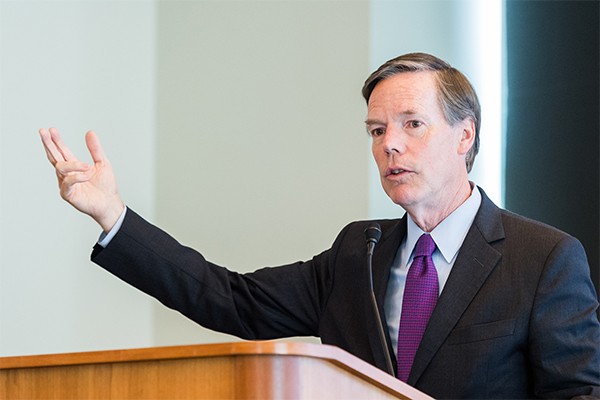
Nicholas Burns (’78), speaking recently at BC Carroll / Photo via bc.edu
He said, “There’s no question that by the next century, we’ll be a Pacific world,”
You can read more about the conference here.



